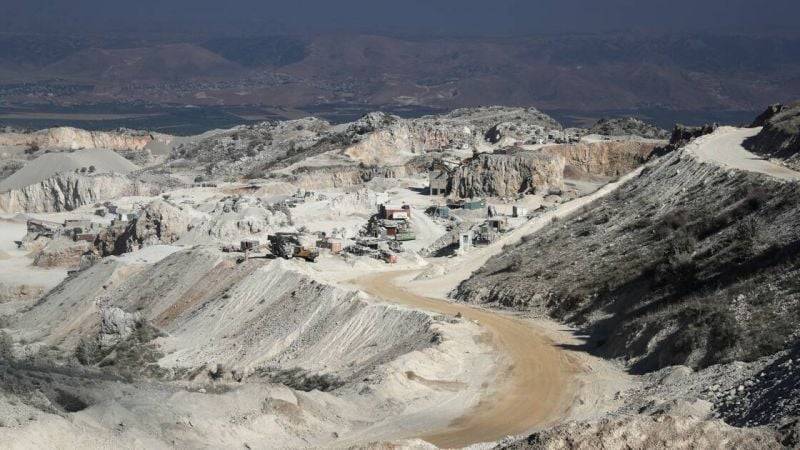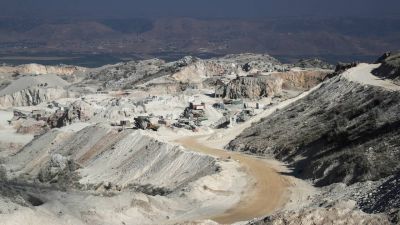
A quarry digs into the mountains near the village of Ain Dara, in July 2019. (Credit: Joseph Eid/AFP)
The chairman of the parliamentary Environment Committee, MP Ghayath Yazbeck (Lebanese Forces (LF)/Batroun), along with other LF MPs, presented a draft law on Wednesday to regulate the rock and sand quarrying sector.
This initiative returns the spotlight to this forgotten sector, which has been plagued by corruption and mismanagement.
Speaking to L’Orient-Le Jour, Yazbeck takes stock of this ecological disaster and financial drain, and explains why legislation in such a troubled context is crucial.
How does the quarrying sector function in the midst of a crisis?
There is an almost cancerous proliferation of rock and sand quarries in the country, in a context of total chaos. There are currently between 1,300 and 1,400 quarries [figures provided by the National Council for Quarrying], but if you count those operating illegally under permits that have nothing to do with quarries, this number can be easily doubled.
These unregulated quarries pollute the soil and groundwater, eat up green spaces and damage roads with trucks. What’s more, they use all kinds of explosives that are officially banned for this type of civil activity.
For their part, the authorities concerned have been hiding behind the argument that they are no longer granting operating permits. Yet, the Interior Ministry and some local authorities, such as the mohafez (governor) or qaimaqam (district commissioner) are regularly granting permits to move rocks, which are being abused as a pretext for a totally uncontrolled exploitation of these sites.
Worst of all, the regulation of this sector would be a real windfall for the state, a source of revenue hitherto ignored by the authorities. A recent study by the Environment Ministry and the United Nations Development Program (UNDP) showed that the loss of revenue to the state in the quarrying sector [mainly due to unpaid taxes] is almost $2.4 billion.
For years, the quarrying sector has been regulated only by Decree No. 8803, which is not even strictly enforced. What would your draft law add?
In our draft law, we are trying to redefine the very concept of a quarry more clearly by including, in particular, the notions of respect for the nature of the soil, environmental impact etc.
We are also working to widen the circle of players who have a binding opinion on quarry permits, in particular the Order of Engineers [and Architect] and local authorities, while strengthening the role of the Environment Ministry and National Council for Quarrying [chaired by the minister], which is currently totally dysfunctional.
Control over deadlines and quantities imposed will also have to become stricter, as will the requirement to rehabilitate degraded sites.
This is added to the need to adjust the amount of taxes imposed on quarry operators in line with the changes that have occurred since the start of the economic and financial crisis [in 2019].
How can you hope to push for the passing of this law when priorities are elsewhere amid a total collapse?
The important thing for us was to submit this draft, which will make its way through the parliamentary committees. But we are under no illusions: first the institutions have to get back on track, particularly with the election of a president …
But all is not lost. The spirit of this law can begin to influence decision-making even if the draft is not yet in force. As proof of this, our group of MPs met [caretaker] Interior [Minister] Bassam Mawlawi shortly before the draft was submitted to Parliament: he was sympathetic to our arguments and promised to halt the granting of [quarrying] permits of any kind until further notice. Public opinion is also more aware of these issues and regularly exerts pressure to prevent the damage from continuing.
This article was originally published in French. Translation by Joelle El Khoury.
